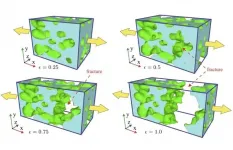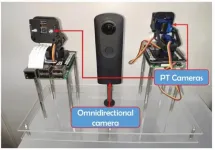Immunocompromised pediatric patients showed T-cell activity and humoral immunity against SARS-CoV-2
New study suggests COVID vaccines may still be helpful for patients with antibody deficiency disorders
2021-05-13
(Press-News.org) According to data from a cohort of adult and pediatric patients with antibody deficiencies, patients that often fail to make protective immune responses to infections and vaccinations showed robust T-cell activity and humoral immunity against SARS-CoV-2 structural proteins. The new study, led by researchers at Children's National Hospital, is the first to demonstrate a robust T-cell response against SARS-CoV-2 in immunocompromised patients.
"If T-cell responses to SARS-CoV-2 are indeed protective, then it could suggest that adoptive T-cell immunotherapy might benefit more profoundly immunocompromised patients," said Michael Keller, M.D., director of the Translational Research Laboratory in the Program for Cell Enhancement and Technologies for Immunotherapy (CETI) at Children's National. "Through our developing phase I T-cell immunotherapy protocol, we intend to investigate if coronavirus-specific T-cells may be protective following bone marrow transplantation, as well as in other immunodeficient populations."
The study, published in the Journal of Clinical Immunology, showed that patients with antibody deficiency disorders, including inborn errors of immunity (IEI) and common variable immunodeficiency (CVID), can mount an immune response to SARS-CoV-2. The findings propose that vaccination may still be helpful for this population.
"This data suggests that many patients with antibody deficiency should be capable of responding to COVID-19 vaccines, and current studies at the National Institutes of Health and elsewhere are addressing whether those responses are likely to be protective and lasting," said Dr. Keller. The T-cell responses in all the COVID-19 patients were similar in magnitude to healthy adult and pediatric convalescent participants.
Kinoshita et al. call for additional studies to further define the quality of the antibody response and the longevity of immune responses against SARS-CoV-2 in immunocompromised patients compared with healthy donors. Currently, there is also very little data on adaptive immune responses to SARS-CoV-2 in these vulnerable populations.
The study sheds light on the antibody and T-cell responses to SARS-CoV-2 protein spikes based on a sample size of six patients, including a family group of three children and their mother. All have antibody deficiencies and developed mild COVID-19 symptoms, minus one child who remained asymptomatic. Control participants were the father of the same family, who tested positive for COVID-19, and another incidental adult (not next of kin) experienced mild COVID-19 symptoms. The researchers took blood samples to test the T-cell response in cell cultures and provided comprehensive statistical analysis of the adaptive immune responses.
"This was a small group of patients, but given the high proportion of responses, it does suggest that many of our antibody deficient patients are likely to mount immune responses to SARS-CoV-2," said Dr. Keller. "Additional studies are needed to know whether other patients with primary immunodeficiency develop immunity following COVID-19 infection and will likely be answered by a large international collaboration organized by our collaborators at the Garvan Institute in Sydney."
INFORMATION:
Media contact: Valeria Sabate | vsabate@childrensnational.org | 202-476-6741
ELSE PRESS RELEASES FROM THIS DATE:
2021-05-13
Scientists at the Skolkovo Institute of Science and Technology (Skoltech) and their colleagues from the University of Graz & the Kanzelhöhe Observatory (Austria) and the ESA European Space Operations Centre developed a method and software called RESONANCE to predict the solar radio flux activity for 1-24 months ahead. RESONANCE will serve to improve the specification of satellite orbits, re-entry services, modeling of space debris evolution, and collision avoidance maneuvers. The research results were published in the high-profile Astrophysical Journal Supplement Series.
Since the launch of Sputnik, the Earth's first artificial satellite, in ...
2021-05-13
The work was sponsored by Russian Science Foundation; the project, headed by Professor Anatolii Mokshin, is titled "Theoretical, simulating and experimental research of physico-mechanical traits of amorphous-producing systems with heterogeneous local visco-elastic properties".
"We performed calculations for porous nitinol," shares first co-author, Associate Professor Bulat Galimzyanov. "It's widely used in various industries thanks to its unique physico-mechanical properties, such as low volume weight, high corrosion resistance, high biocompatibility and shape memory. Obtaining nitinol as amorphous foam is very labor-intensive, it requires high temperatures and extremely high melt cooling rate (over 1,000,000 K per second). Obviously, traditional experiments ...
2021-05-13
A large-scale randomised trial of annual screening for ovarian cancer, led by UCL researchers, did not succeed in reducing deaths from the disease, despite one of the screening methods tested detecting cancers earlier.
Results from the UK Collaborative Trial of Ovarian Cancer Screening (UKCTOCS) have been published in a report in the medical journal The Lancet.
In the UK, 4,000 women die from ovarian cancer each year. It is not usually diagnosed until it is at a late stage and hard to treat. UKCTOCS was designed to test the hypothesis that a reliable screening ...
2021-05-13
BOSTON - B cells are the immune cells responsible for creating antibodies, and most B cells, known as B2 cells, produce antibodies in response to a pathogen or a vaccine, providing defense and immunity against infections. But a small subset of long-lived B cells, known as B1 cells, are quite different from their short-lived cousins, the B2 cells. Instead of producing antibodies in response to invaders, they spontaneously make antibodies that perform vital housekeeping functions, such as removing waste like oxidized LDL cholesterol from the blood.
Like all the cells in the body, B1 and B2 cells have the same DNA, and therefore the same starting set of instructions. It is through epigenetic modifications, which ...
2021-05-13
PROVIDENCE, R.I. [Brown University] -- Since the 1950s, political scientists have theorized that political polarization -- increased numbers of "political partisans" who view the world with an ideological bias -- is associated with an inability to tolerate uncertainty and a need to hold predictable beliefs about the world.
But little is known about the biological mechanisms through which such biased perceptions arise.
To investigate that question, scientists at Brown University measured and compared the brain activity of committed partisans (both liberals and conservatives) as ...
2021-05-13
If you're a fan of spy movies, you've probably come across scenes where the intelligence agents try to identify or detect a perpetrator using some sophisticated image enhancement technology on surveillance camera images. While the idea behind surveillance cameras and object detection is the same in real life, unlike in movies, there is often a trade-off between the camera's field-of-view and its resolution.
Surveillance cameras are typically required to have a wide field-of-view to make the detection of a threat more likely. Due to this, omnidirectional ...
2021-05-13
The first frost of autumn may be grim for gardeners but the latest evidence reveals it is a profound event in the life of plants.
The discovery may affect how we grow crops in a fluctuating climate and help us better understand molecular mechanisms in animals and humans.
Much of our understanding of how plants register temperature at a molecular level has been gained from the study of vernalization - the exposure to an extended period of cold as a preparation for flowering in spring.
Experiments using the model plant Arabidopsis have shown how this prolonged period of cold lifts the brake on flowering, a gene called FLC. This biochemical brake also involves another molecule COOLAIR which is antisense to FLC. This means it lies on the ...
2021-05-13
Researchers at Hospital for Special Surgery (HSS) have identified gaps in patient knowledge about pain management and opioid use before total hip replacement, including misconceptions about how much pain relief to expect from opioids after surgery, how to use multiple modes of pain relief (multimodal analgesia) safely and effectively, and proper opioid storage and disposal. These findings were presented at the 2021 Spring American Society of Regional Anesthesia and Pain Medicine (ASRA) Annual Meeting.1
"Patients who are not taught about opioids and pain management may have difficulty with pain control and worse functional outcomes after total ...
2021-05-13
Researchers at Hospital for Special Surgery (HSS) have identified risk factors for persistent opioid use after surgery in pediatric patients.1 Study findings were presented at the 2021 Spring American Society of Regional Anesthesia and Pain Medicine (ASRA) Annual Meeting.
Previous research indicates that prescription patterns for opioids after surgery in children and adolescents may be associated with long-term use and abuse.2
"Pediatric patients have developing brains that are uniquely vulnerable to addiction, and we need to learn to treat their pain safely without putting them at additional ...
2021-05-13
In a study carried out in mice at the University of Chicago, researchers found that lasofoxifene outperformed fulvestrant, the current gold-standard drug, in reducing or preventing primary tumor growth. It also was more effective at preventing metastasis in the lung, liver, bone and brain, the four most common areas for this cancer to spread.
Additionally, while fulvestrant and similar drugs often cause unwanted, menopausal-like side effects, lasofoxifene prevents some of these symptoms. The research was published on May 13 in END ...
LAST 30 PRESS RELEASES:
[Press-News.org] Immunocompromised pediatric patients showed T-cell activity and humoral immunity against SARS-CoV-2
New study suggests COVID vaccines may still be helpful for patients with antibody deficiency disorders


